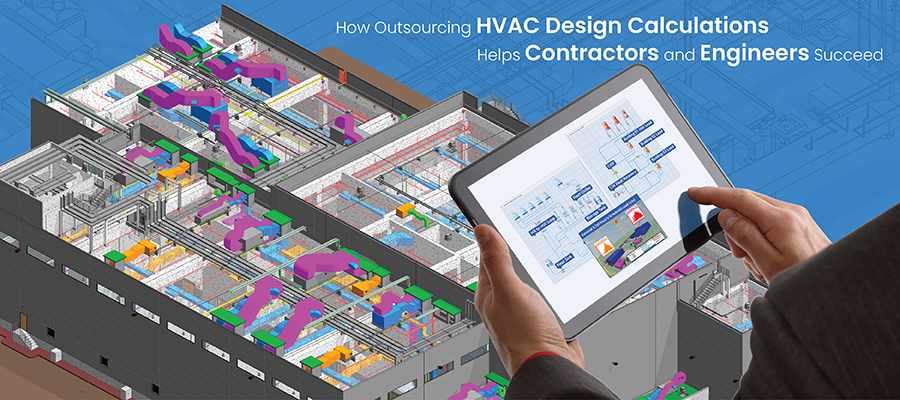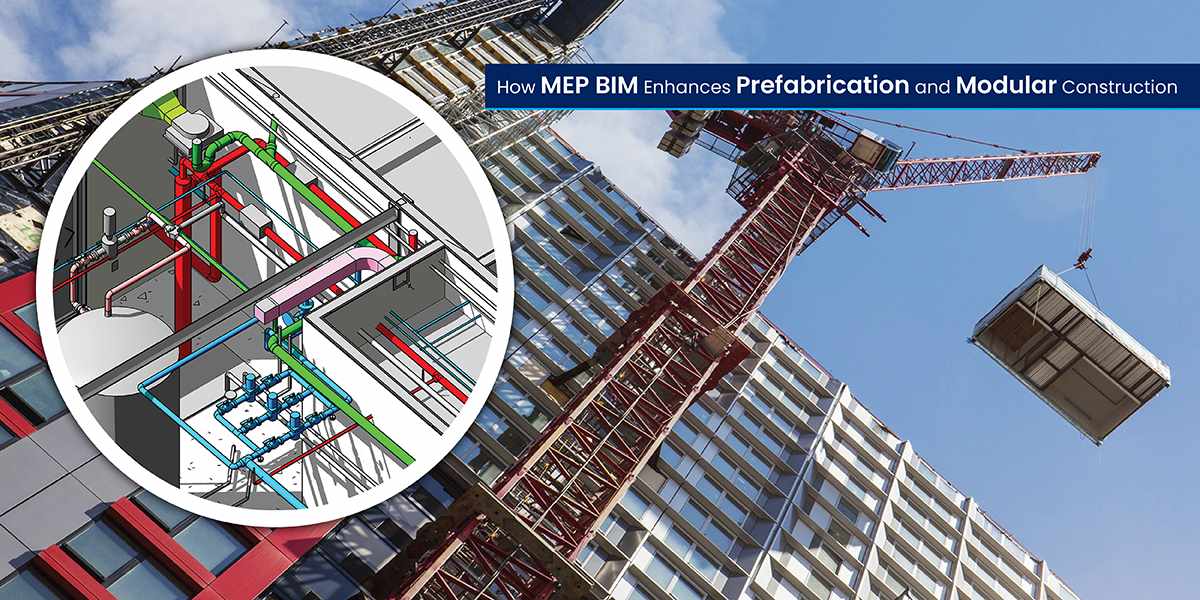
Outsourced HVAC design services help contractors and engineers reduce costs, improve efficiency, and ensure high-quality results by leveraging specialized expertise and advanced technology. While challenges such as communication and data security exist, a reliable outsourcing partner can streamline operations and enhance project outcomes.
HVAC design plays a critical role in construction and engineering in creating energy-efficient, comfortable, and sustainable indoor environments. However, performing HVAC design calculations in-house can often present challenges, from high costs to time constraints and the need for specialized expertise. Outsourcing HVAC design services has become a practical solution for contractors and engineers looking to optimize their operations and ensure high-quality outcomes.
This article discusses the benefits of outsourcing HVAC design calculations, the common concerns, and how remote design teams can deliver efficient, accurate, and cost-effective results.
Top 8 benefits of outsourcing HVAC design calculations

1. Access to specialized expertise
Outsourcing HVAC design services gives contractors and engineers access to highly skilled professionals with extensive experience in HVAC system design optimization. These experts ensure compliance with HVAC industry standards, use advanced software and optimize energy efficiency in system layouts.
2. Outsourcing reduces HVAC design costs
One of the major benefits of outsourcing HVAC design is cost efficiency. Contractors eliminate expenses related to hiring full-time engineers, investing in premium HVAC design software, and managing in-house teams. Instead, they convert fixed costs into flexible, project-based expenses, making outsourcing HVAC design calculations a cost-effective solution
3. Time efficiency
Outsourcing enables contractors to delegate time-consuming design tasks to remote teams, freeing internal resources to focus on core project activities. With experienced professionals handling HVAC design calculations, projects can progress more quickly, meeting tight deadlines without compromising on quality.
4. Improved accuracy
Outsourced HVAC engineering teams bring a wealth of knowledge and experience, reducing the risk of errors in design calculations. These teams utilize advanced tools and software to create HVAC system layouts, and perform precise load calculations, duct sizing, and system layouts, ensuring that the designs meet performance requirements while optimizing energy efficiency.
5. Scalability and flexibility
Outsourcing provides contractors with the flexibility to scale resources based on project demands. Whether it’s a small residential project or a large commercial building, remote HVAC design teams can adjust their capacity to accommodate varying workloads, ensuring seamless project execution.
6. Focus on core competencies
Delegating HVAC design services to external experts allows contractors and engineers to concentrate on their core competencies, such as project management, client relationships, and construction. This streamlined approach enhances overall productivity and operational efficiency.
7. Access to advanced tools and technology
One of the overlooked benefits of outsourcing HVAC design is access to advanced technology. Remote teams use the latest HVAC design software, including energy modeling and load calculation tools to ensure efficiency and compliance with industry standards.
8. Global talent pool
Remote HVAC design teams bring diverse perspectives and innovative solutions to the table. By outsourcing, contractors and engineers gain access to a global network of talent, enriching their projects with fresh ideas and approaches.
Tips for overcoming common challenges in outsourcing HVAC engineering services
While outsourcing offers numerous benefits, it’s essential to address potential challenges to ensure a successful partnership:
Communication and Collaboration: Effective communication is key to aligning expectations and avoiding misunderstandings. Using collaborative tools and maintaining regular updates can help bridge the gap.
Data Security: Contractors must ensure that sensitive project data is protected. Partnering with reputable outsourcing providers with robust data security measures is crucial.
Quality Assurance: To maintain high standards, contractors should review the outsourcing team’s portfolio, client testimonials, and industry certifications before engagement.
How remote teams handle HVAC design for complex projects?
Remote HVAC design teams are equipped to handle complex projects with efficiency and precision. Here’s how they do it:
Comprehensive Project Analysis: Remote teams conduct thorough assessments of project requirements, constraints, and goals to create customized solutions.
Advanced Software Utilization: By leveraging cutting-edge tools for modeling, simulations, and calculations, remote teams deliver optimized HVAC designs.
Collaborative Workflows: Using cloud-based platforms, remote teams collaborate seamlessly with on-site personnel, ensuring alignment and real-time updates.
Adherence to Industry Standards: Outsourcing partners ensure compliance with local codes and international standards, guaranteeing high-quality deliverables.
Key considerations before outsourcing HVAC design
To maximize the benefits of outsourcing HVAC Design for contractors and engineers should evaluate the following:
Experience and Expertise: Assess the outsourcing partner’s track record, industry knowledge, and proficiency in HVAC design calculations.
Communication Capabilities: Ensure the team is responsive and proficient in maintaining transparent communication.
Cost and Turnaround Time: Discuss pricing models, timelines, and deliverables upfront to avoid discrepancies.
Scalability: Choose a partner who can accommodate changing project requirements.
Reputation and Client Feedback: Review testimonials and case studies to gauge the partner’s reliability and performance.
Conclusion
An HVAC design services provider offers contractors and engineers a strategic advantage, enabling them to optimize their operations, save time and costs, and deliver exceptional results. With access to specialized expertise, advanced tools, and scalable resources, outsourcing provides a viable solution for overcoming challenges associated with in-house design.
While potential hurdles like communication and data security require attention, the benefits of outsourcing engineering services far outweigh the drawbacks. By partnering with a trusted HVAC design services provider, contractors can ensure accurate, efficient, and compliant HVAC system designs, empowering them to meet project demands with confidence.
For contractors and engineers seeking to stay competitive in today’s fast-paced industry, outsourcing HVAC design is not just an option—it’s a smart investment in efficiency, innovation, and success.





Write a comment ...